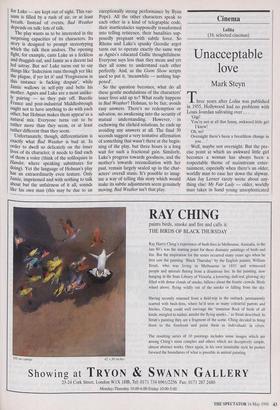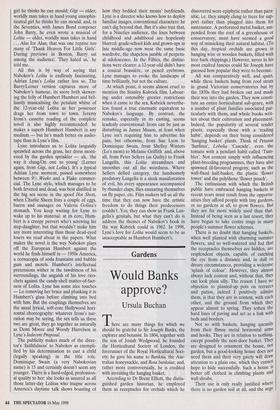Cinema
Lolita
(18, selected cinemas)
Unacceptable love
Mark Steyn
Three years after Lolita was published in 1955, Hollywood had no problems with Louis Jourdan salivating over ...
`Gigi!
You're not at all that funny, awkward little girl I knew!
Oh, no!
Overnight there's been a breathless change in you ...'
Well, maybe not overnight. But the pre- cise point at which an awkward little girl becomes a woman has always been a respectable theme of mainstream enter- tainment, especially when there's an older, worldly man to ease her down the slipway. Alan Jay Lerner rarely wrote about any- thing else: My Fair Lady — older, worldly man takes in hand young unsophisticated girl he thinks he can mould; Gigi — older, worldly man takes in hand young unsophis- ticated girl he thinks he can mould; and, in the Seventies, with James Bond composer John Barry, he even wrote a musical of Lolita — older, worldly man takes in hand ... Alas for Alan, that was one reprise too many of 'Thank Heaven For Little Girls'. During previews in Boston, Barry sat among the audience: 'They hated us,' he told me.
All this is by way of saying that Nabokov's Lolita is endlessly fascinating, Adrian Lyne's Lolita rather less so. The Barry/Lerner version captures more of Nabokov's humour, its score both skewer- ing the folly of Humbert Humbert and bril- liantly musicalising the petulant whine of the 12-year-old Lolita as her possessor drags her from town to town. Jeremy Irons's cassette reading of the complete novel is also highly recommended: he makes a superb Humbert Humbert in any medium — but he's much better on audio- tape than in Lyne's film.
Lyne introduces us to Lolita languidly sprawled across the grass, her dress moist- ened by the garden sprinkler — ah, 'the way it clung/On one so young' (Lerner again, from Gigi, not Lolita). It's a typical Adrian Lyne moment, poised somewhere between 9'/2 Weeks and a Flake commer- cial. The Lyne style, which manages to be both fevered and dead, was best distilled in the big sex scene in the spoof Hot Shots, when Charlie Sheen fries a couple of eggs, bacon and sausages on Valeria Golina's stomach. You keep waiting for Lyne to wake up to his material: at its core, Hum- bert is a creepy pervert who's screwing his step-daughter, but that wouldn't make him any more interesting than those dead-eyed losers we read about in the papers. What makes the novel is the way Nabokov plays off the European Humbert against the world he finds himself in — 1950s America, a cornucopia of soda fountains and bubble gum and motels. Humbert's intellectual pretensions wither in the tawdriness of his surroundings, the anguish of his love rico- chets against the candy-shell matter-of-fact- ness of Lolita. Lyne has some nice touches — Lo removing her brace and plunking it in Humbert's glass before climbing into bed with him. But the couplings themselves are the usual lyrical, soft-core Hollywood hori- zontal choreography: whatever Irons's nar- ration may be saying, the sex tells us these two are great, they go together as naturally as Demi Moore and Woody Harrelson in Lyne's Indecent Proposal.
The publicity makes much of the direc- tor's 'faithfulness' to Nabokov as exempli- fied by his determination to cast a child (legally speaking) in the title role. Dominique Swain (a very Nabokovian name) is 15 and certainly doesn't seem any younger. There is a hard-edged, profession- al quality to her: she looks as assured as all those latter-day Lolitas who traipse across America's daytime talk shows boasting of how they bedded their moms' boyfriends. Lyne is a director who knows how to deploy familiar images, conventional characters: he can't dig beyond that. But it's also true that, for a Nineties audience, the lines between childhood and adulthood are hopelessly blurred: grade-school kids and grown-ups in late middle-age now wear the same basic wardrobe, the shapeless jumble of perpetu- al adolescence. In the Fifties, the distinc- tions were clearer: a 12-year-old didn't have a conical brassiere, or pencil eyebrows. Lyne manages to evoke the landscape of time brilliantly, but not the culture.
At which point, it seems almost cruel to mention the Stanley Kubrick film. Labour- ing under ostensibly greater restrictions when it came to the sex, Kubrick neverthe- less found a true cinematic equivalent to Nabokov's language. By contrast, the remake, especially in its casting, seems leadenly conventional: Irons can be just as disturbing as James Mason, at least when Lyne isn't requiring him to advertise his pain; but otherwise, from Sue Lyon to Dominique Swain, from Shelley Winters (La's mom) to Melanie Griffith and, above all, from Peter Sellers (as Quilty) to Frank Langella, this Lolita streamlines and smoothes out all the weirdness. Where Sellers defied category, the handsomely predatory Langella is a sleek manifestation of evil, his every appearance accompanied by thunder claps, flies ensnaring themselves on fly paper, etc. Film makers tell us all the time that they can now have the artistic freedom to do things their predecessors couldn't. Yes, they can show us Frank Lan- gella's genitals, but what they can't do is address the themes of Nabokov's book in the way Kubrick could in 1962. In 1998, Lyne's love for Lolita would seem to be as unacceptable as Humbert Humbert's.



























































 Previous page
Previous page